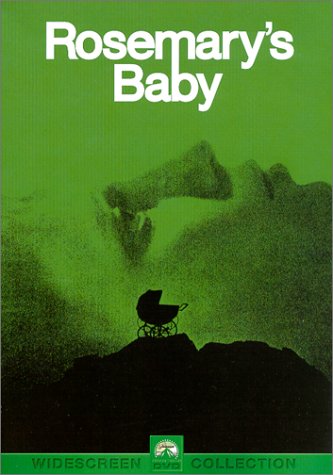
ROSEMARY'S BABY
US, 1968, 135 minutes, Colour.
Mia Farrow, John Cassavetes, Ruth Gordon, Maurice Evans, Sidney Blackmer, Ralph Bellamy.
Directed by Roman Polanski.
Rosemary's Baby is an excellently made thriller about the diabolical. It created some controversy on its first release (the subject, the implications of the Incarnation of the devil, the weird conception dream). Curiosity was roused again in 1969 when Sharon Tate, Pulaski’s wife, and her friends were murdered by the Manson 'family'.
Now that the controversy has been over for some time, the film can be appreciated for what it is. Naturally, it is not to everyone's taste, but for an adult audience, it could be an absorbing, if unsettling, experience. For the film deals with real evil in our midst, the nature of religion and of superstition which is the religion of the devil.
For those who worship Satan and believe in him, there must be some strong parallels between worship of him and of God. Here some of these parallels are spelt out when Rosemary's Baby, the son of the devil, is born. The film explores reasons why evil attracts and it seems to be terrifying and destroying.
Polanski continues his skill in letting atmosphere work on his audience rather than sensational shocks. Little things build up fear. Mia Farrow moves from normality to tenderness, suspicion to hysteria and gives a fine performance. Sidney Blackmer and Ruth Gordon (who won an Oscar) are excellent as the typical but sinister neighbours. At the end of Those Fearless Vampire Killers Professor Abronsin good-naturedly carries two vampires into the world who could destroy it - a frightening thought - but this is only fiction). Here Rosemary good-naturedly mothers her child who could destroy the world - frightening fiction again.
Rosemary's Baby raises many worthwhile questions about good and evil, religion and superstition.
1. Why was this film made? What would have interested Roman Polanski in this story?
2. Why was the film so popular at the box-office - curiosity? entertainment? a good drama? interesting theme?
3. The whole story as plausible? Could it be in any way true?
4. What really happened? How much was fact and how much Rosemary's imagination and fear? Note down all the indications on either side.
5. How did Polanski create his atmosphere? Did he rely on any of the usual horror film techniques? Comment on the use of hints, of the suicide, the book and scrabble anagram, the use of music, the sentence in the telephone booth?
6. Did you like Rosemary? Did you think her normal? were there any hints as to what would happen?
7. Did you like Guy? Did you suspect him of being involved with the witches? Was his behaviour peculiar? What about the blindness of the actor?
8. Did you like Roman and Minnie? Did you suspect them of being witches - the coven, the sham, Terry 's death, the houses, the drinks?
9. The dream sequence - what did it man? What about the previous imagining with Rosemary and the nuns?) How much did the Catholic background play a part - the nuns, the Pope's visit on the night of the conception, Roman's attack on religion and the superstition of the Pope and Rosemary taking offence although she was no longer a Catholic?
10. How was the atmosphere of the strange pregnancy built up - Dr Saperstein, Minnie's attentions, the pain, Rosemary 's looks, Satan's visit, the party with her 'normal' friends?
11. Why did Rosemary begin to worry about witches after Hutch's death? Why did she ring the blind actor? Why did she believe Guy had joined with them?
12. Were you relieved when she told her story to Dr Sill? What was your reaction when Dr Hill brought in Guy and Dr Saperstein?
13. Was Dr Hill acting ethically? What else could he have done?
14. Were you still suspicious after the birth of the baby?
15. Rosemary was so afraid that the witches would use her baby for rituals that she said she would kill it first. Did she intend to kill it when she took the knife into the Castanet's flat?
16. Were you shocked when you heard that the child was the incarnation of the devil? Why?
17. Why did the screenplay parallel the devil-worship with Christian traditions - the year 1, the adoration, Minnie's proclamation to Rosemary, the visitor bearing gifts? Was this blasphemous? Why?
18. Could Rosemary ever agree to Guy's plan that they should now have more children after this episode which would help them so much?
19. Why was there a conflict in Rosemary about the nature of the child and the fact that it was her child and she had carried it for so long? As a mother, could she do otherwise than care for the baby? Can she forget Hutch's death, Guy's complicity?
20. What was the significance of the Lullaby of the mother over the rooftops of New York?
21. Is the film just a well-made thriller involving witchcraft, to be seen and enjoyed by those who appreciate good drama?